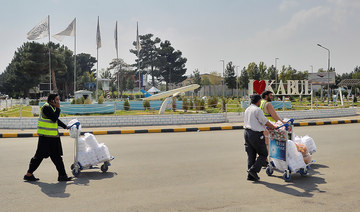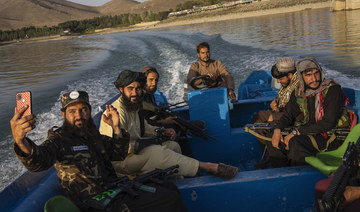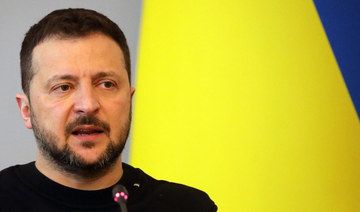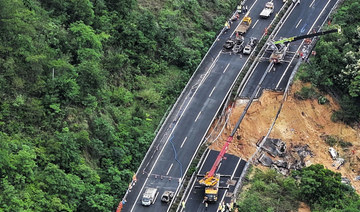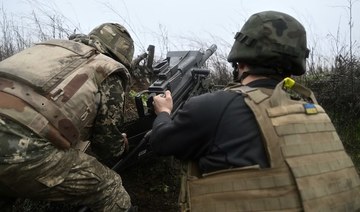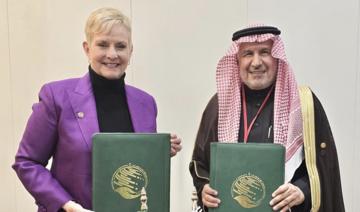NEW YORK: It’s been little more than a month since Kalashnikov-toting Taliban fighters in their signature heavy beards, hightop sneakers and shalwar kameezes descended on the Afghan capital and cemented their takeover. Now they’re vying for a seat in the club of nations and seeking what no country has given them as they attempt to govern for a second time: international recognition of their rule.
The Taliban wrote to the United Nations requesting to address the UN General Assembly meeting of leaders that is underway in New York. They argue they have all the requirements needed for recognition of a government. The UN has effectively responded to the Taliban’s request by signaling: Not so fast.
Afghanistan, which joined the UN in 1946 as an early member state, is scheduled to speak last at the General Assembly leaders’ session on Monday. With no meeting yet held by the UN committee that decides challenges to credentials, it appears almost certain that Afghanistan’s current ambassador will give the address this year — or that no one will at all.
The UN can withhold or bestow formal acknowledgement on the Taliban, and use this as crucial leverage to exact assurances on human rights, girls’ access to education and political concessions. This is where the power — and relevance, even — of the 76-year-old world body still holds.
Afghanistan is a good, and perhaps extreme, representative case study of precisely why the United Nations was founded in the aftermath of World War II, said Rohinton Medhora, president of the Center for International Governance Innovation in Canada.
“If you’re the UN and you want to represent the family of nations, then you want absolutely everyone of the family there — even you know, the distant cousin that not everyone’s proud of,” he said. “So the UN needs Afghanistan and countries to demonstrate the value of many of its operations.”
In Afghanistan, the United Nations can deploy the weight of its vast aid and development programs to show just how crucial its often underfunded agencies are in providing stability and security. The country is facing multiple humanitarian crises and near-total poverty due to fallout from the political situation.
There are already growing calls for aid to be contingent on ensuring girls’ access to education. Despite promises to be inclusive and open, the Taliban have yet to allow older girls back to school, have curtailed local media freedoms and returned to brutal practices like publicly hanging dead bodies in city squares.
“Taliban does not represent the will of the Afghan people,” Afghanistan’s currently accredited ambassador to the UN in Geneva, Nasir Andisha, told The Associated Press.
If the United Nations recognizes the Taliban’s claim to power, Andisha said, then it sends a corrosive message to others — be it in Yemen or in Myanmar — that they can take up guns, create violence, join with US-designated terrorist groups.
“I think for the world, for the United Nations, it’s time to use this as a leverage,” Andisha said.
The Taliban’s appointed UN representative, Suhail Shaheen, a former negotiator and political spokesman, told The Associated Press that his government should be admitted into the club of nations and that “all borders, territory and major cities of Afghanistan are in our control.”
“We have support of our people and because of their support, we were able to continue a successful struggle for independence of our country which culminated in our independence,” he said. “We have all the requirements needed for recognition of a government. So we hope the UN as an neutral World Body recognize the current government of Afghanistan.”
More than a dozen ministers in the all-Taliban Cabinet are on a UN blacklist, including the group’s foreign minister, whom Andisha and other Afghan diplomats abroad are refusing to speak to.
Andisha was serving in Geneva under the US-backed government of Ashraf Ghani when the president fled Afghanistan Aug. 15 to seek refuge in the United Arab Emirates as the Taliban encircled the capital. Ghani’s government swiftly fell thereafter.
Andisha is still holding meetings with representatives from countries around the world, imploring them to push for the resuscitation of intra-Afghan peace talks. He wants the United Nations to make clear that joining its ranks is not only about “holding a country under the barrels of your guns and having enough population taken hostage.”
Meanwhile, Qatar has urged countries not to boycott the Taliban, and Pakistan called on nations to avoid isolating the Taliban, and to incentivize them to hold to their promises of renouncing terrorism and being inclusive.
The United States, which withdrew all its forces from the country last month in a chaotic airlift that ended America’s “forever war,” says it is critical that the international community remains united in ensuring the Taliban meets a range of commitments before granting legitimacy or support beyond humanitarian aid.
Secretary of State Antony Blinken said this is the message he delivered to the UN Security Council and others on the sidelines of the General Assembly this week.
The US has “significant leverage when it comes to the Taliban,” State Department spokesman Ned Price told reporters Friday. “But we have all the more leverage when we work in coordination and in harmony with our allies and partners around the globe,” he added.
Medhora, of the Center for International Governance Innovation, said the UN has levers it can use through its various agencies, such as UNICEF, which focuses on children, UNHCR, which assists refugees, and the World Food Program, all “where the actual work of the UN gets done.” This is another area where the United States has major sway as the the largest donor to the United Nations, contributing nearly one-fifth of funding for the body’s collective budget in 2019, according to the Council on Foreign Relations.
In multiple UN speeches this past week, a number of world leaders mentioned Afghanistan, including US President Joe Biden and Afghanistan’s neighbors, such as Pakistan, Iran and Uzbekistan.
Enayat Najafizada, who runs an independent think tank in Kabul that monitors security issues in Afghanistan’s provinces, said the UN should also facilitate negotiations between Afghan groups and bring the various countries with a history of meddling in the nation on board for the sake of regional security.
“Without forming an inclusive government, the country will move to a civil war,” said Najafizada, founder of The Institute of War and Peace Studies.
Although what comes next for Afghanistan is far from certain, it is clear the Taliban do not want to be seen as global pariahs, said Kamal Alam, nonresident senior fellow at the Atlantic Council.
“They want a seat at the UN They want to go to Davos. They like the private jet lifestyle,” he said, referring to the group’s political elite who reside in exile in Qatar.
“But that’s only the political leaders. The foot soldiers on the ground, there’s no such thing as ‘the new Taliban’,” he said. “There is no new Taliban. Everything they’re doing is a tactic to get recognition as well as not be isolated.”
UN and Afghanistan’s Taliban, figuring out how to interact
https://arab.news/cc2rj
UN and Afghanistan’s Taliban, figuring out how to interact
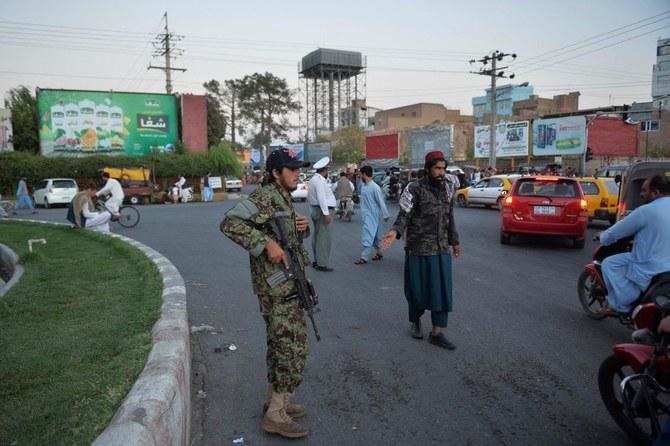
- The Taliban wrote to the UN requesting to address the UNGA that is underway in New York
- They argue they have all the requirements needed for recognition of a government
Afghanistan’s only female diplomat resigns in India after gold smuggling allegations
According to Indian media reports, she has not been arrested because of her diplomatic immunity
ISLAMABAD: Afghanistan’s diplomat in India, who was appointed before the Taliban seized power in 2021 and said she was the only woman in the country’s diplomatic service, has resigned after reports emerged of her being detained for allegedly smuggling gold.
Zakia Wardak, the Afghan consul-general for Mumbai, announced her resignation on her official account on the social media platform X on Saturday after Indian media reported last week that she was briefly detained at the city’s airport on allegations of smuggling 25 bricks of gold, each weighing 1 kilogram (2.2 pounds), from Dubai.
According to Indian media reports, she has not been arrested because of her diplomatic immunity.
In a statement, Wardak made no mention of her reported detention or gold smuggling allegations but said, “I am deeply sorry that as the only woman present in Afghanistan’s diplomatic apparatus, instead of receiving constructive support to maintain this position, I faced waves of organized attacks aimed at destroying me.”
“Over the past year, I have encountered numerous personal attacks and defamation not only directed toward myself but also toward her close family and extended relatives,” she added.
Wardak said the attacks have “severely impacted my ability to effectively operate in my role and have demonstrated the challenges faced by women in Afghan society.”
The Taliban Foreign Ministry did not immediately return calls for comment on Wardak’s resignation. It wasn’t immediately possible to confirm whether she was the country’s only female diplomat.
She was appointed consul-general of Afghanistan in Mumbai during the former government and was the first Afghan female diplomat to collaborate with the Taliban.
The Taliban — who took over Afghanistan in 2021 during the final weeks of US and NATO withdrawal from the country — have barred women from most areas of public life and stopped girls from going to school beyond the sixth grade as part of harsh measures they imposed despite initial promises of a more moderate rule.
They are also restricting women’s access to work, travel and health care if they are unmarried or don’t have a male guardian, and arresting those who don’t comply with the Taliban’s interpretation of hijab, or Islamic headscarf.
Russia puts Ukraine's Zelensky on wanted list, TASS reports
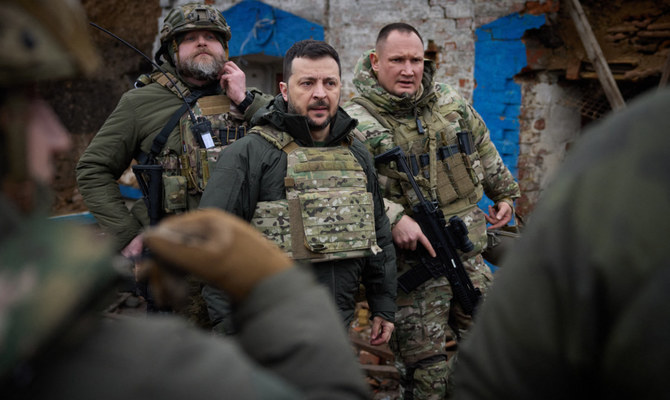
- Russia has issued arrest warrants for a number of Ukrainian and other European politicians
MOSCOW: Russia has opened a criminal case against Ukrainian President Volodymyr Zelensky and put him on a wanted list, the state news agency TASS reported on Saturday, citing the Interior Ministry's database.
The entry it cited gave no further details.
Russia has issued arrest warrants for a number of Ukrainian and other European politicians since the start of the conflict with Ukraine in February 2022.
Russian police in February put Estonian Prime Minister Kaja Kallas, Lithuania's culture minister and members of the previous Latvian parliament on a wanted list for destroying Soviet-era monuments.
Russia also issued an arrest warrant for the International Criminal Court (ICC) prosecutor who last year prepared a warrant for President Vladimir Putin on war crimes charges.
A Chinese driver is praised for helping reduce casualties in a highway collapse that killed 48
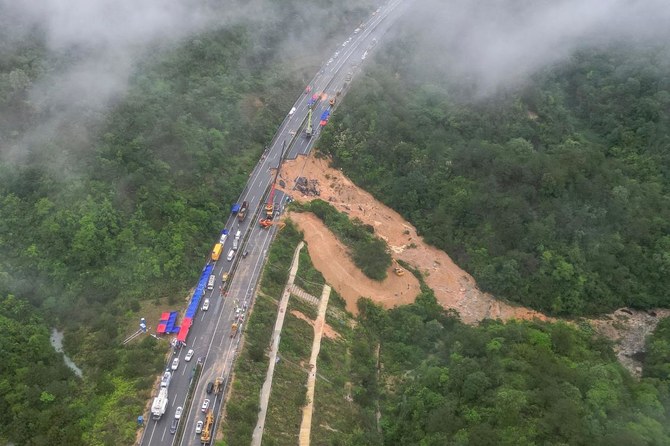
- Reacting swiftly, Wang, a former soldier, positioned his truck to block the highway, effectively stopping dozens of vehicles from advancing into danger
- His wife got out of the truck to alert other drivers about the situation
BEIJING: A Chinese truck driver was praised in local media Saturday for parking his vehicle across a highway and preventing more cars from tumbling down a slope after a section of the road in the country’s mountainous south collapsed and killed at least 48 people.
Wang Xiangnan was driving Wednesday along the highway in Guangdong province, a vital economic hub in southern China. At around 2 a.m., Wang saw several vehicles moving in the opposite direction of the four-lane highway and a fellow driver soon informed him about the collapse, local media reported.
Reacting swiftly, Wang, a former soldier, positioned his truck to block the highway, effectively stopping dozens of vehicles from advancing into danger, Jiupai News quoted Wang as saying. Meanwhile, his wife got out of the truck to alert other drivers about the situation, it said.
“I didn’t think too much. I just wanted to stop the vehicles,” Wang told the Chinese news outlet.
Wang’s courageous actions not only garnered praise from Chinese social media users but also recognition from the China Worker Development Foundation.
The foundation announced Friday that in partnership with a car company it had awarded Wang 10,000 yuan ($1,414). A charity project linked to tech giant Alibaba Group Holding also gave an equal amount to Wang, newspaper Dahe Daily reported. Wang told the newspaper he would donate the money to the families of the collapse victims.
Local media also reported that another man had knelt down to prevent cars from proceeding on the highway.
The accident came after a month of heavy rains in Guangdong. Some of the 23 vehicles that plunged into the deep ravine burst in flames, sending up thick clouds of smoke.
About 30 people were hospitalized. On Saturday, one was discharged from the hospital, state broadcaster CCTV reported. The others were improving, but one remains in serious condition.
On Saturday, the Meizhou city government in Guangdong said in a statement that authorities would conduct citywide checks on expressways, railways and roads in mountainous areas. A team led by the provincial governor is investigating the cause of the collapse, Southcn.com reported.
The Chinese government had sent a vice premier to oversee recovery efforts and urged better safety measures following calls by President Xi Jinping and the Communist Party’s No. 2 official, Premier Li Qiang, to swiftly handle the tragedy.
The dispatch of Zhang Guoqing, who is also a member of one of the ruling Communist Party’s leading bodies, illustrates the concern over a possible public backlash over the disaster, the latest in a series of deadly infrastructure failures.
Russia says it shot down four US-made long range missiles over Crimea

- The ATACMS missiles, with a range up to 300km were used for the first time in the early hours of April 17
MOSCOW: The Russian defense ministry said on Saturday its air defense forces shot down four US-produced long-range missiles over the Crimea peninsular, weapons known as Army Tactical Missile Systems (ATACMS) that Washington has shipped to Ukraine in recent weeks.
The ministry said later that Russian aircraft and air defense systems had downed a total of 15 ATACMS in the past week.
On Tuesday, Russian officials said Ukraine had attacked Crimea with ATACMS in an attempt to pierce Russian air defenses of the annexed peninsula but that six had been shot down.
A US official said in Washington last month that the United States secretly shipped long-range missiles to Ukraine in recent weeks.
The ATACMS missiles, with a range up to 300km were used for the first time in the early hours of April 17, launched against a Russian airfield in Crimea that was about 165 km (103 miles) from the Ukrainian front lines, the official said.
The Pentagon initially opposed the long-range missile deployment, concerned that taking the missiles from the American stockpile would hurt US military readiness.
There were also concerns that Ukraine would use them to attack targets deep inside Russia, a step which could lead to an escalation of the war toward a direct confrontation between Russia and the United States.
Separately on Saturday, the Russian defense ministry said that in the last week its forces had destroyed a military train carrying equipment and arms produced in the West and supplied to Ukraine by NATO.
The scale of the damage, exact date and location were not disclosed.
Reuters is not immediately able to corroborate battlefield accounts from either side.
On Thursday, British Foreign Secretary David Cameron promised 3 billion pounds ($3.7 billion) of annual military aid for Ukraine for “as long as it takes,” adding that London had no objection to its weapons being used inside Russia, drawing a strong rebuke from Moscow.
South Sudan removes newly imposed taxes that had triggered suspension of UN food airdrops
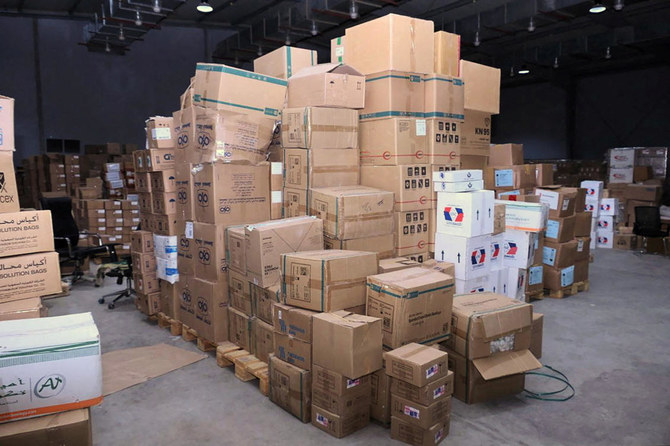
- The UN earlier this week urged South Sudanese authorities to remove the new taxes, introduced in February
- There was no immediate comment from the UN on when the airdrops could resume
JUNA, South Sudan: Following an appeal from the United Nations, South Sudan removed recently imposed taxes and fees that had triggered suspension of UN food airdrops. Thousands of people in the country depend on aid from the outside.
The UN earlier this week urged South Sudanese authorities to remove the new taxes, introduced in February. The measures applied to charges for electronic cargo tracking, security escort fees and fuel.
In its announcement on Friday, the government said it was keeping charges on services rendered by firms contracted by the UN peacekeeping mission in South Sudan.
“These companies are profiting ... (and) are subjected to applicable tax,” Finance Minister Awow Daniel Chuang said.
There was no immediate comment from the UN on when the airdrops could resume.
Earlier, the UN Humanitarian Affairs Agency said the pausing of airdrops had deprived 60,000 people who live in areas inaccessible by road of desperately needed food in March, and that their number is expected to rise to 135,000 by the end of May.
The UN said the new measures would have increased the mission’s monthly operational costs to $339,000. The UN food air drops feed over 16,300 people every month.
At the United Nations in New York, UN spokesman Stéphane Dujarric said the taxes and charges would also impact the nearly 20,000-strong UN peacekeeping mission in South Sudan, “which is reviewing all of its activities, including patrols, the construction of police stations, schools and health care centers, as well as educational support.”
An estimated 9 million people out of 12.5 million people in South Sudan need protection and humanitarian assistance, according to the UN The country has also seen an increase in the number of people fleeing the war in neighboring Sudan between the rival military and paramilitary forces, further complicating humanitarian assistance to those affected by the internal conflict.



